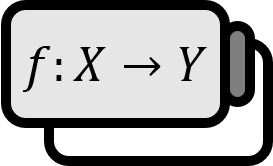Various Properties of Convex Functions
Theorem1
All convex functions are continuous.
If $f$ is an increasing convex function, and $g$ is a convex function, then $f \circ g$ is also a convex function.
If $f$ is convex in $(a, b)$, and if $a \lt s \lt t \lt u \lt b$, then $$ \dfrac{f(t) - f(s)}{t-s} \le \dfrac{ f(u) - f(s) }{ u - s } \le \dfrac{ f(u) - f(t) }{ u - t } $$
If $f$ is a continuous function defined in $(a, b)$ that satisfies the following, then it is a convex function. $$ f \left( \dfrac{ x + y }{ 2 } \right) \le \dfrac{ f(x) + f(y) }{ 2 },\quad x,y \in (a,b) $$
Let $f=F^{\prime}$ be an increasing function. Then $F$ is convex.
Proof
52.
Let’s say $a\le x \le y \le b$.
$$ \begin{align*} F(y) - F(\frac{ x + y }{ 2 }) &= \int_{\frac{ x + y }{ 2 }}^{y} f(t) dt \\ F(\frac{ x + y }{ 2 }) - F(x) &= \int_{x}^{\frac{ x + y }{ 2 }} f(t) dt \end{align*} $$
Since $f$ is an increasing function,
$$ \int_{x}^{\frac{ x + y }{ 2 }} f(t) dt \le \int_{\frac{ x + y }{ 2 }}^{y} f(t) dt \ge $$
$$ \implies F(\frac{ x + y }{ 2 }) - F(x) \le F(y) - F(\frac{ x + y }{ 2 }) $$
$$ 2 \implies F(\frac{ x + y }{ 2 }) \le F(y) + F(x) $$
$$ \implies F(\frac{ x + y }{ 2 }) \le \dfrac{ F(y) + F(x) }{ 2 } $$
According to 4., $F$ is convex.
■
Walter Rudin, Principles of Mathmatical Analysis (3rd Edition, 1976), p101 ↩︎
https://math.stackexchange.com/questions/1318407/integral-of-an-increasing-function-is-convex ↩︎
